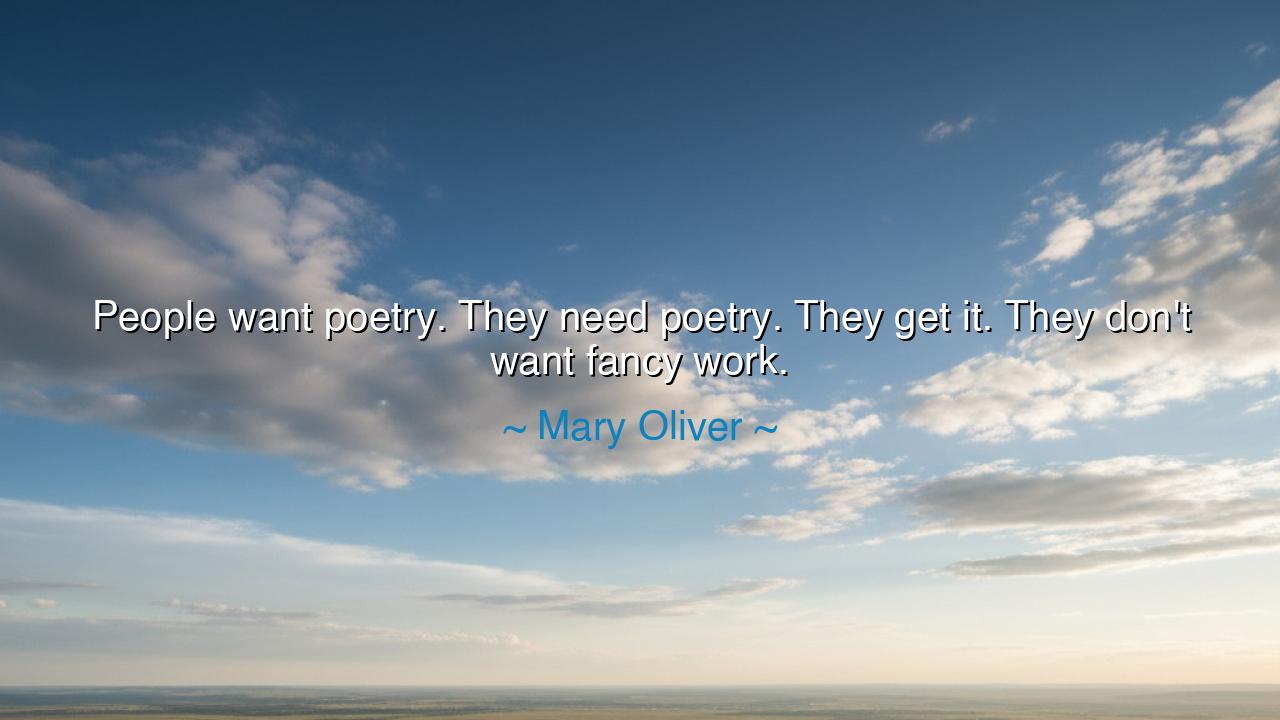
People want poetry. They need poetry. They get it. They don't






Mary Oliver, poet of the earth and quiet witness of the fields, once declared: “People want poetry. They need poetry. They get it. They don’t want fancy work.” In these words she lays bare a truth that echoes across all ages—that poetry is not an ornament for the privileged few, nor a puzzle crafted only for scholars. It is a necessity, a food for the human spirit. People hunger for poetry, though they may not call it by that name, for it speaks to their loneliness, their longing, their joy, and their sorrow. And what they seek is not the gilded complexity of vanity, but the plain truth that sings.
The origin of this wisdom lies in Oliver’s own life and art. She walked in meadows and woods, listening to the songs of birds and the silence of dawn. Her poetry is simple, but not shallow—direct, but filled with mystery. She knew that human beings do not crave cleverness for its own sake, but authenticity. The “fancy work” of contrived words may glitter for a moment, but it cannot satisfy the heart. What endures is the direct touch of truth expressed in rhythm and image, the kind of poetry that makes the soul pause and whisper: “Yes, that is what I have felt, though I could not name it.”
History provides us with testimony to this need. Consider Walt Whitman, whose Leaves of Grass broke from the rigid traditions of poetry in his time. Critics mocked its lack of refinement, its unpolished rhythms, its shocking intimacy. Yet the people embraced it, for Whitman’s verses spoke to the worker, the soldier, the lover, the mourner. His words were not fancy, but they were alive. He gave poetry to the people in a language they recognized, and so his voice endures across generations.
Oliver’s statement also speaks to a deeper truth about the human condition. People may live without many things, but they cannot live without meaning. Poetry gives shape to meaning; it turns fleeting emotions into lasting form, unites the private soul with universal experience. It is not a luxury but a necessity, for without it the human spirit withers. This is why poetry has existed in every culture, from the chants of shamans to the hymns of temples, from the ballads of minstrels to the verses of revolutionaries. People need poetry because it is the language of the soul.
And yet Oliver warns us: people do not want “fancy work.” Poetry must not be adorned to the point of emptiness, nor so abstract that it loses its pulse. True poetry speaks plainly, though with beauty. It does not hide behind pride of intellect, but lowers itself into the dust and rises with the truth of being human. The greatest poets are not those who weave the most intricate puzzles, but those who speak in words that pierce to the marrow of existence. Simplicity is not weakness—it is strength refined.
The lesson we inherit is this: when you write, when you speak, when you live—seek authenticity above adornment. Do not chase complexity for its own sake. Speak as one human to another, and your words will carry power. Read poetry not for ornament, but for nourishment; and share it not to impress, but to connect. For this is the true purpose of art—not to exalt the ego, but to sustain the soul.
Practically, this means embracing simplicity in expression. Write letters, keep journals, read aloud verses that stir your heart. Do not worry whether your words are grand or polished; worry whether they are true. When you encounter poetry, let it be the kind that roots you deeper into life, that helps you see the world more clearly, that reminds you to breathe and to love. Carry poetry into daily living—not as fancy work, but as bread for the spirit.
Thus Mary Oliver’s words shine with enduring guidance: “People want poetry. They need poetry. They get it. They don’t want fancy work.” Let us honor this hunger in ourselves and others. Let us give not glitter, but truth; not ornament, but essence. For poetry, in its simplest form, is enough—it always has been, and it always will be.






TDNguyen Thuy Duong
This quote makes me reflect on the type of art we seek in our lives. People often crave something raw and accessible, rather than overly polished or complex. I wonder, though, do we sometimes miss out on the deeper, layered meanings in more sophisticated poetry? Is there a balance between simplicity and complexity in art that we should be striving for?
HPDieu Hoang Pham
It’s interesting how Mary Oliver describes poetry as something people want but not necessarily in a fancy form. Why is it that we are drawn to simplicity in art but often reward complexity in other areas of life? Could it be that poetry’s power lies in its ability to express profound truths in an uncomplicated, pure way? It’s a good reminder not to overcomplicate what’s meant to be simple.
NNNgan Nguyenthi
I feel like this quote touches on the notion that people seek connection with something real and honest, not something over-engineered. Do we sometimes overlook the raw beauty of simplicity in our quest for perfection? I think Mary Oliver is reminding us that poetry doesn’t have to be complicated to have depth. Maybe it’s the genuine, straightforward aspects of life that we need most.
NHNguyen Helena
I find this quote very interesting because it suggests that people have a deep, almost innate, desire for poetry in its simplest form. It makes me think, do we sometimes complicate things too much in art or in life? Maybe the beauty of poetry lies in its ability to express universal feelings in a way that is relatable, not overthought. Does the simplest language speak to people more than complex, intricate poetry?